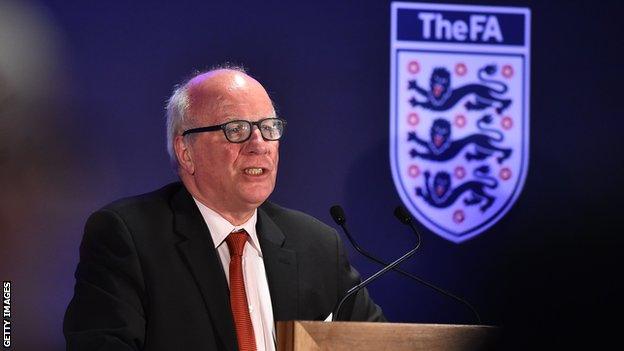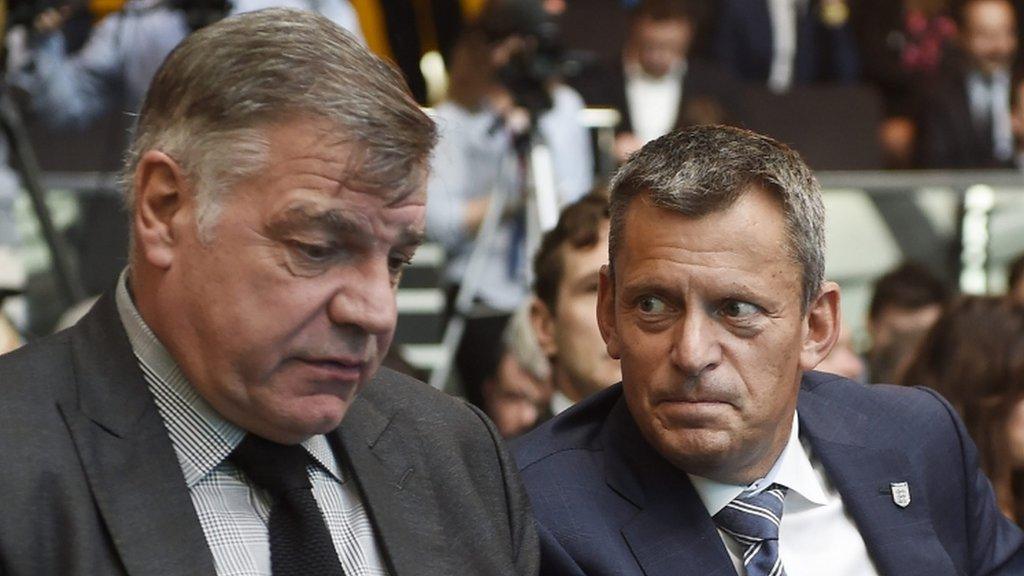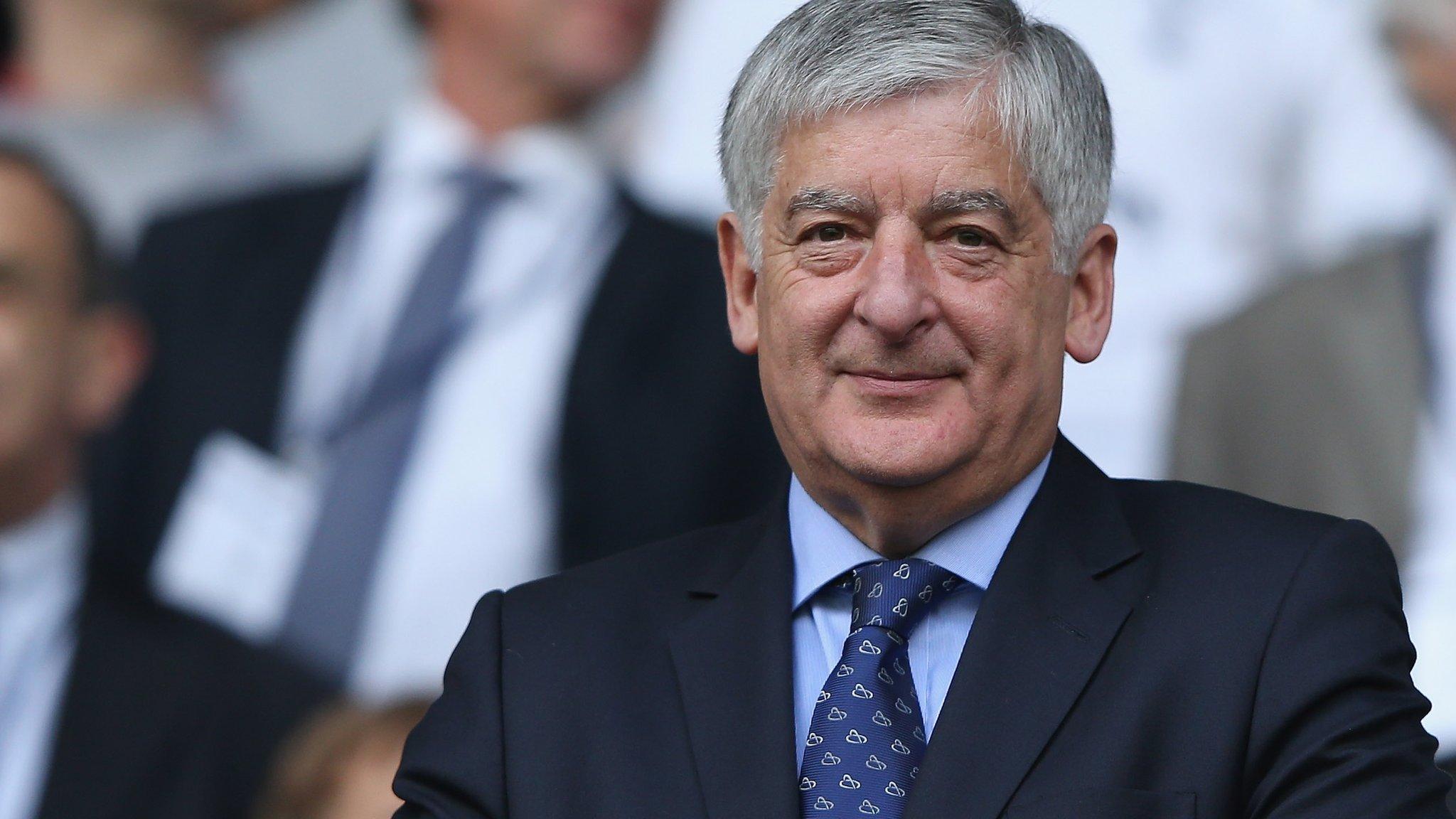FA reform: Former chiefs say 'elderly white men' block change
- Published
- comments
Damian Collins MP: 'We no longer have any confidence'
The Football Association is outdated, held back by "elderly white men" and unable to counter the power of the Premier League, say five former executives of the governing body.
David Bernstein, David Davies, Greg Dyke, Alex Horne and David Triesman say the FA has failed to "self-reform".
The five have asked Parliament's Culture, Media and Sport committee to propose legislation to reform the FA.
Committee chairman Damian Collins MP has said "time has run out" for the FA.
"It may well move us to redressing the woeful lack of English players or managers and the embarrassing failures of our national team for the past 50 years," the five conclude in a letter to Mr Collins.
The FA has been under increased scrutiny following allegations of historical sex abuse in the game.
Among the points made by the five former FA executives are:
The Premier League's financial power has a knock-on effect "right through the football pyramid".
The FA is compelled to contribute tens of millions of pounds to the Premier League, rather than the grassroots of the game.
The majority of those in senior positions are under-qualified to deal with the complexities of the FA structures.
The FA Board is neither an independent board nor an independent regulator.
Collins responded by saying the committee "shares your concern" and confirmed a draft bill to deliver the necessary reform was being prepared.
But in an interview with the BBC, the committee chairman went a step further.
"We feel now that time has run out," said Collins. "We no longer have any confidence that the FA can or will reform itself.
"We now have an invitation from former chairmen of the FA to act in the best interests of football and to legislate to restructure the FA and in many ways give the power back to people who play football."
Who are the five?
Former FA Chairman Greg Dyke tells Radio 4's Today FA is like travelling back to 1952
Dyke is the most recent of the five to have held a position at the FA, which they say has an "inability to reform and modernise in a fast-changing world".
Triesman became the FA's first independent chairman in January 2008 but resigned in 2010, later saying it was "impossible" to make the changes, external he wanted during his time in the role.
Bernstein spent three years in the same role before stepping down in 2013 and being succeeded by Dyke, who left the position in August before being replaced by Greg Clarke.
Davies is a former executive director, while Horne was finance director, managing director of Wembley Stadium, chief operating officer and general secretary at the FA, before leaving in January 2015 after 11 years at the organisation.
What is wrong with the game?
Football changes 'not fast enough' says David Davies
The letter says a "focused intervention" may "move us to redressing the woeful lack of English players or managers and the embarrassing failures of our national team for the past 50 years".
It also highlights the domination of the Premier League (EPL) because of its "financial might", and added that "worse still, there are some 25 life vice-presidents on the FA Council - all elderly white men - who do not represent anyone but block even the most minor of changes".
They said: "It is little wonder that English football is out of balance. The FA has neither the modernity of approach nor independence required to counter the EPL juggernaut, or to modernise its own governance."
The quintet agreed with the findings of the Culture, Media and Sport committee's reports on football governance in 2011 and 2013, which concluded that the FA needed urgent reform.
"The FA has been given more than enough time to self-reform and therefore we now ask that parliament take this on board, recognise that further promises of change are not serious, and legislate as necessary, including the appointment of a regulator to achieve the changes that are so desperately needed," the five said.
Why didn't the five change anything?
Bernstein said that during his reign as FA chairman he "tried very hard to push a reformist agenda", and the fact he got a female independent director onto the board was a "minor miracle".
He believes that the "only place to get change" is through Parliament.
"It was very difficult and Greg Dyke and Lord Triesman have found the same thing," he told BBC Radio 5 live.
"I suspect that if the present FA chairman wanted and had the desire to make change, he would also [find it difficult].
"We have all come to the conclusion that it will only be through outside intervention that we will get change."
FA meetings 'like going back to 1952'
Dyke told the BBC that FA meetings "bear no resemblance to Britain today".
He added: "I was white, male and aging, and I decided that ought to be changed.
"The reason I left the FA after three years as chairman last year was because I could not get that change through. It was impossible."
Figures show that, of the FA Council's 122 members:
12 are aged over 80
92 are aged over 60
Eight are women
Four are from ethnic minority backgrounds
What was the response?
The FA says it is working on governance reforms to adhere to Sport England and UK Sport's Governance Code for Sport, which was released in October.
"The FA welcomes the new code as a means of ensuring that sports organisations in receipt of public money are operating in an effective and transparent manner that best supports their sports," the governing body said in a statement.
"We will continue to work with the appropriate bodies, DCMS [Department for Culture, Media and Sport] and Sport England, to achieve this joint ambition."
The Premier League says it has "kept patience when past chairmen and chief executives have failed to deliver" and has supported the FA's reforms.
"We will keep working hard to ensure standards are maintained and bettered," it said in a statement. "Others in the game have a responsibility to do the same."
Greg Dyke: Premier League is a cartel
Was there other reaction?
The Manchester United Supporters Trust (M.U.S.T), the largest supporters trust in British football, said FA reform was "decades overdue" and "demanded" that the Government "step in and make this happen".
Its chief executive Duncan Drasdo said the main FA board needed a "majority of independent directors to curb the undue and inappropriate influence of the powerful vested interests in the game" and that the FA Council must become a "powerful advisory board" including supporters' representation "without whom the game is nothing".
Women in Sport - which calls for a target of 30% women on the boards of sporting bodies - said: "We want to take this opportunity to stress the importance of change that enables women to play a full role in the leadership of football".
Asked about the story at a news conference on Monday, Arsenal boss Arsene Wenger said: "Football and politics should not be together.
"Football is a very special activity and it should be ruled by football people. When you look at history when sport and politics mix, it's not for the benefit of sport."
The new chairman of the British Olympic Association, Sir Hugh Robertson, backed what he described as "a very significant intervention".
"If the DCMS committee report gets turned into a piece of legislation then they will be forced to reform kicking and screaming," he told BBC sports editor Dan Roan.
"If I was to give football one piece of advice, it's to get on and reform itself now - before legislation becomes necessary."

Greg Dyke, who ended his tenure as FA chairman in August, is among the signatories.
Any other obstacles?
BBC Radio 5 live sports news correspondent Richard Conway reports that, while Damian Collins may be drafting legislation, it would still need government backing for it to be passed - and previous governments have not previously showed signs of supporting any new law to enforce reform.
He also reports that football's world governing body Fifa has rules stating football associations must be "independent and avoid any form of political interference".
Fifa has taken action on government's interfering in the affairs of other football associations in the past.
Analysis
Dan Roan, BBC sports editor
For years, the FA has stubbornly resisted mounting pressure from fans and politicians to modernise and break the stranglehold of the vested interests on its Board.
But this blistering attack on the way football is run - and the Premier League's dominance of power and wealth - could prove harder to ignore.
The FA could well point out that however well-intentioned, today's criticism comes from three white men in their 60s and 70s who ran the organisation for a combined total of eight years.
But at a time when football is already under intense scrutiny over the child sex abuse scandal, these former FA executives - along with the Culture, Sport and Media committee - have thrown down a gauntlet; the demand for legislation, a regulator and even a vote of no confidence in the FA will horrify a sport that fiercely guards its autonomy, and insists it has made recent progress.
However, while the government has threatened the FA with funding cuts unless reforms happen soon, its appetite to get even tougher is far from certain.
Take part in our new Premier League Predictor game, which allows you to create leagues with friends.
- Published28 September 2016

- Published3 July 2016
